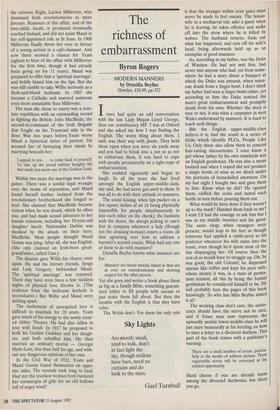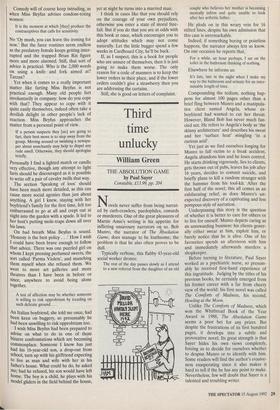The richness of embarrassment
Byron Rogers
MODERN MANNERS by Drusilla Beyfus
Hamhln, £16.99, pp.352
Ionce had quite an odd conversation with the late Lady Megan Lloyd George, then our constituency MP. I was at Oxford and she asked me how I was finding the English. The worst thing about them, I said, was their way with doors. They held these open when you were six yards away and you had to break into a run so as not to embarrass them. It was hard to cope with people permanently on a tight-rope of embarrassment.
She nodded vigorously and began to laugh. In all the years she had lived amongst the English upper-middle-class, she said, she had never got used to them. It was all to do with their attitude to manners.
The social kissing, when lips pucker on a few square inches of air (it being physically impossible for people simultaneously to kiss each other on the cheek); the business with the doors; the abrupt jerking to one's feet in company whenever a lady (though not the cleaning woman) enters a room; all that agonising over how to address a baronet's second cousin. What had any one of these to do with manners?
Drusilla Beyfus knows what manners are for:
Manners are minor morals, based as they are at core on considerateness and showing respect for the other person.
Yet she goes and writes a book about them as big as a family Bible, something guaran- teed either to fill people with unease or just make them fall about. But then the trouble with the English is that they have rules.
The Welsh don't. For them the only rule
Sky Lights
Are mostly small, tend to leak, don't in fact light the sky, though seldom have bars, need no curtains and do look to the stars.
Gael Turnbull
Is that the stranger within your gates must never be made to feel uneasy. The house- wife in a mediaeval tale asks a guest when he is leaving; he takes offence and walks off into the snow where he is killed by wolves. The husband returns, finds out what has happened, and cuts off his wife's head, being afterwards held up as an exemplar of good manners.
As, according to my father, was the Duke of Windsor. He had not met him, had never met anyone who had, yet from some- where he had a story about a banquet at which the Duke was present, when some- one drank from a finger-bowl. I don't think my father had seen a finger-bowl either, yet according to him the Duke noticed the man's great embarrassment and promptly drank from his own. Whether the story is true or not, it was what a carpenter in west Wales understood by manners. It is hard to teach such things.
But the English upper-middle-class believe it is, and the result is a series of tricks which identify PLUs, People Like Us. Only these also allow them to conceal hair-raising discourtesies. I once knew a girl whose father by his own standards was an English gentleman. He was also a mean bastard and when I stayed did not produce a single bottle of wine as we dined under the portraits of bemedalled ancestors. On my last night I bought two and gave them to him. Know what he did? He opened them, sniffed the corks and tasted each bottle in turn before pouring them out.
What would he have done if they weren't up to the mark? Handed them back to me? I wish I'd had the courage to ask him but I was in my middle twenties and his guest. The same chap, when strangers were present, would leap to his feet as though someone had applied a cattle-prod to his posterior whenever his wife came into the room, even though he'd spent most of the day disparaging her. Of course then the rest of us would have to straggle up. Oh, he was good, the old Colonel; he dispensed unease like toffee and kept his poor wife, whose money it was, in a state of perma- nent tension, all this by being the formal gentleman he considered himself to be. He will probably turn the pages of this book knowingly. So who has Miss Beyfus aimed it at?
The working class don't care, the aristo- cracy should have the nerve not to care, and if Essex man now represents the upwardly mobile lower-middle-class he will just stare bemusedly at his briefing on how to start a letter to a divorced duchess. This part of the book comes with a publisher's warning: There are a small number of errors, particu- larly in the modes of address section. These regrettable errors will be corrected at the earliest opportunity
Hard cheese if you are already loose among the divorced duchesses, but there you go. Comedy will of course keep intruding, as when Miss Beyfus advises condom-toting women: It is the moment at which [they] produce the contraceptives that calls for sensitivity.
No `Oy mush, you can leave the ironing for now.' But the farce routines seem endless as the predatory female keeps getting inter- rupted and the trapped Brian Rix figure more and more alarmed. Still, that sort of advice is practical. Who is the 2,000 words on using a knife and fork aimed at? Tarzan?
Yet when it comes to a really important matter like farting Miss Beyfus is not practical enough. Many old people fart involuntarily in company: how do you cope with that? They appear to cope with it quite easily themselves, indeed often take a devilish delight in other people's lack of reaction. Miss Beyfus approaches the matter from a personal point of view.
If a person suspects they [sic] are going to fart, their best move is to step away from the group. Moving around or swishing a newspa- per about nonchantly may help to dispel any rude smell. Otherwise, they should apologise briefly.
Personally I find a lighted match or candle very effective, though any attempt to light farts should be discouraged as it is possible to write off a pair of cavalry twills that way. The section 'Speaking of loos' should have been much more detailed, as this can cause more social agonies than just about anything. A girl I knew, staying with her boyfriend's 'family for the first time, felt too embarrassed to go at all and crept out at night into the garden with a spade. It led to her host's putting mole-traps down all over his lawn.
On bad breath Miss Beyfus is sound. 'Honesty is the best policy. . .' How I wish I could have been brave enough to follow that advice. There was one puzzled girl on whom I kept pressing perfumed sweets, the sort called 'Parma Violets', and munching them myself when she refused them. We went to more art galleries and more theatres than I have been in before or since, anywhere to avoid being alone together.
A test of affection may be whether someone is willing to risk opprobrium by treading on such delicate ground ...
An Italian boyfriend, she told me once, had been keen on buggery, so presumably he had been unwilling to risk opprobrium too.
I wish Miss Beyfus had been prepared to advise on what to do in one of those bizarre confrontations which are becoming Commonplace. Someone I know has just had his 16-year-old son, a drop-out from school, turn up with his girlfriend expecting to live as man and wife with her in his father's house. What could he do, he asked me; had he refused, his son would have left home. The boy is a child, he plays with his model gliders in the field behind the house, yet at night he turns into a married man.
I think in cases like that you should rely on the courage of your own prejudices, otherwise you enter a state of moral free- fall. But if you do that you are at odds with this book at once, which encourages you to adopt attitudes which may not come naturally. Let the little bugger spend a few weeks in Cardboard City, he'll be back.
If, as I suspect, this is a book for people who are unsure of themselves, then it is just going to make them worse. The only reason for a code of manners is to keep the lower orders in their place, and if the lower orders couldn't give a strawberry then you are addressing the curtains.
Still, she is good on letters of complaint.



















































 Previous page
Previous page